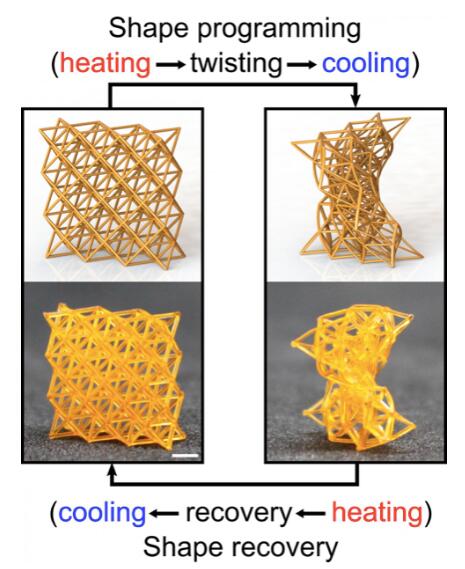4D Printed Metamaterials Could Be Used in Plane Wings, Biomedical Devices, More
A team of engineers from Rutgers University-New Brunswick have developed 4D printable smart materials capable of changing their properties—morphing between being stiff as wood and as soft as a sponge. The innovative materials could have applications in airplane or drone wings, soft robotics, implantable biomedical devices and more.
The world of 4D printing is full of exciting potential. Presently, it is mostly limited to the research sphere, as materials engineers and scientists develop new formulations capable of changing shape or form when exposed to certain temperature, light or chemical changes. Essentially, 3D printing + time (and external factor) = 4D printing.
In this particular research project—published in the journal Materials Horizons—the Rutgers engineers have created a new class of printable metamaterials that can be triggered to become rigid or soft. The metamaterials have been engineered to take on properties not found in nature and can be programmed to change their properties entirely.
As Howon Lee, senior author of the study and assistant professor in the Department of Mechanical and Aerospace Engineering, said: “We believe this unprecedented interplay of materials science, mechanics and 3D printing will create a new pathway to a wide range of exciting applications that will improve technology, health, safety and quality of life.”
The metamaterials—made from a plastic-like material—have tunable properties which change with heat. As the researchers explain, the 3D printed materials stay rigid when they are struck or become soft as a sponge to absorb shock.
The level of stiffness can also be adjusted depending on the temperature. Between room temperature and 194 degrees Fahrenheit, the stiffness can be adjusted more than 100-fold enabling a great degree of shock absorption control. The material can also change form, temporarily transforming itself and then returning to to its original printed shape when heated.

The potential applications for such a 4D printed material are vast: the metamaterials could be used in airplane or drone wings to adjust the shape for better performance; they could be used in the production of soft, flexible robots or for small implantable biomedical devices. In the case of the latter, the materials could be made temporarily soft for a minimally invasive implantation.
Beyond the aforementioned applications, the researchers also say their metamaterials could be used to produce collapsible, lightweight structures that could make launching larger structures, such as solar panels, into space much easier.
Source: 3D Printing Media




Recent Comments